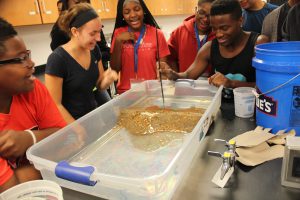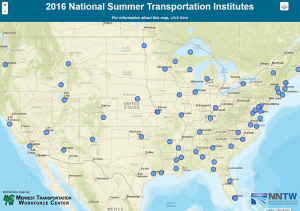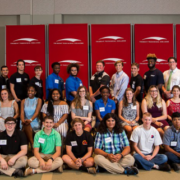Engineering Community Involvement and Hands-On Activities Are Key Strengths of SLU’s Summer Transportation Institute
While many of the parents who sent their high schoolers to Saint Louis University’s Summer Transportation Institute in July may like to see the camp extended to two weeks, this program will continue to provide a one-week experience, packed with daily hands-on activities, to two different groups of students again in 2017.
“We would love to offer the camp as two-week sessions, but, with our current resources, these two, one-week sessions are the only way to serve the maximum number of students,” said camp director, Jalil Kianfar, PhD, Assistant Professor of Civil Engineering at Parks College of Engineering, Aviation, and Technology. Having successfully completed the second year of this program at SLU, Kianfar looks forward to building on the tradition again next year by leveraging what makes the program strong.
Kianfar attributes much of the institute’s success of the program to the support and participation of the local engineering community. “Public agencies and engineering firms have been supportive of the program and local professional organizations such as the Institute of Transportation Engineers, American Society of Civil Engineers, and National Society of Black Engineers helped us get the word out.” The Parks College marketing team also reached out to all the high-school math and science teachers in the region and enlisted their help in reaching out to the students.
This year, more than three times the number of students applied as compared to the year before. About 16 students were accepted into each session, making the program available to a total of 33 students.
“I think that this summer transportation institute was extremely informative about what a traffic engineer actually does and provided a lot of interesting information about how transportation engineers improve travel,” wrote one student on their post-event evaluation.
To make the camp a reality, Kianfar pulled together funds from SLU and the Federal Highway Administration (FHWA) through the National Summer Transportation Institutes (NSTI) program. Missouri Department of Transportation (MoDOT) administered the NTSI funds and has been instrumental to success of the program at SLU. Army Corps of Engineers, ABNA, America’s Central Port, City of St. Louis, CBB Transportation Engineers, East West Gateway Council of Governments, Metro Transit, Missouri Department of Transportation, and St. Louis Downtown Airport either engaged with the students at SLU campus or hosted the students at their facilities.
NSTI programs are conducted in 48 states with funding provided by the FHWA Office of Civil Rights through the OJT Support Services program. In 2016 there were 63 programs nationwide. The program stems from an initial recommendation in 1991, from the FHWA’s Historically Black Colleges and Universities (HBCU) and other Minority Institutions of Higher Education Task Force that partnerships be established to increase the participation of HBCUs, Tribal Colleges and Universities, and Hispanic Serving Institutions in the Agency’s programs. After a six-year pilot program, Congress, in the Transportation Equity Act for the 21st Century, authorized funding for the first transportation career education program for secondary school youth, the NSTI.
To date, more than 8,000 students have participated in the program. Participating colleges and universities throughout the United States, District of Columbia, and Puerto Rico serve as host sites.
An interactive map, with information on each camp, created by the Midwest Transportation Workforce Center can be viewed here.
SLU’s institute is a non-residential camp for students from high schools in the St. Louis metropolitan area featuring a series of field trips, activities, games, and lectures.
Experiential learning is central to the institute’s curriculum. The camp provides opportunities for students to collaborate. “They learn the value of collaboration through hands-on activities, rather than hearing it from us,” said Kianfar. “We want them to see that they can solve real-world problems. They learn they have the ability and background to become engineers.”
Activities this year included traffic impact assessment of a bike-lane, development of a crash data collection system, design and build of a tornado-resilient road sign gantry, flight simulation and quad copter obstacle course, physical modelling of a levee, and a computer programming challenge.

Experiential learning is central to the institute’s curriculum. “They learn the value of collaboration through hands on activities, rather than hearing it from us,” said Kianfar. “We want them to see that they can solve real-world problems. They learn they have the ability and background to become engineers.”
To apply for the free program, students complete an application and submit an essay and a letter of recommendation from a teacher. In selecting the students who will be accepted, a committee of faculty looks for signs of genuine interest on the part of the students and completed math and physics coursework. “In reading the students’ essays, it’s completely obvious those students who have put time and energy into their essays and it is often reflected in the essay that a student is trying to figure out what he or she wants to do in the future,” said Kianfar.
Kianfar notes that scheduling can pose a challenge in a busy area like St. Louis. The camp dates are announced early in the year, in February to give plenty of time to recruit students. Unfortunately, this past summer, the SLU institute coincided with other popular STEM camps in the area and some participants had to choose between them. “In the future, we will try to avoid such conflicts. More and more universities and community colleges are offering summer STEM programs in St. Louis, which is really great for the region,” said Kianfar.
“At SLU, we strive to serve the St. Louis region and it is a privilege to have the opportunity to work with St. Louis youth,” said Kianfar. “The goal of my colleagues and our industry partners is to help students make informed decisions about their future careers and let them know about the opportunities that exist in the transportation industry. It has been very rewarding for us to hear student feedback at the end of the camp and know that they find the camp helpful.”
For more information about the SLU Summer Transportation Institute, contact Rachel Rimmerman at rimmermanr@slu.edu.
To learn more about the NSTI program, contact information for the division office civil rights staff as well as NSTI host sites can be found on FHWA’s HCR website (www.fhwa.dot.gov/civilrights).
| This story is from our regular series of articles highlighting efforts being made here in the Midwest to address transportation workforce issues. We’d like to tell your story, too. Click here to fill out our simple form to get the ball rolling. We know there are great efforts being made across the region. Let’s share our successes! |


